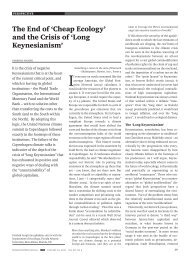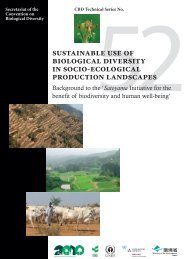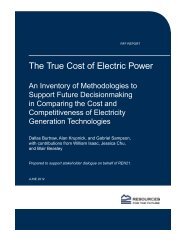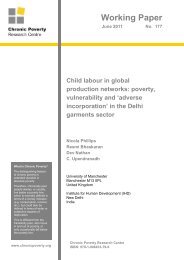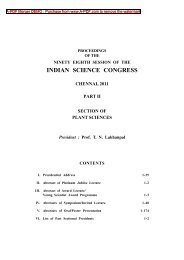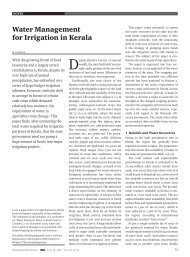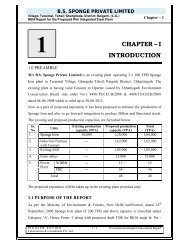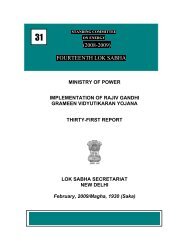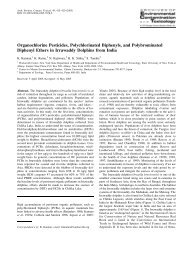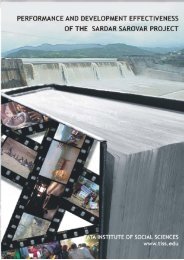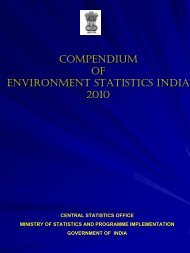Addressing Emissions From Coal Use in Power Generation ...
Addressing Emissions From Coal Use in Power Generation ...
Addressing Emissions From Coal Use in Power Generation ...
You also want an ePaper? Increase the reach of your titles
YUMPU automatically turns print PDFs into web optimized ePapers that Google loves.
Congressional Policy Brief 9<br />
<strong>in</strong>formation on costs, performance, and optimal<br />
configuration, and these <strong>in</strong>itial projects are very<br />
costly. A commercial-scale coal-fueled power plant<br />
costs more than $1-2 billion, and the <strong>in</strong>cremental<br />
cost of add<strong>in</strong>g CCS is <strong>in</strong> the many hundreds of<br />
millions of dollars.<br />
Market-Based CCS<br />
Deployment Incentives<br />
To address obstacles to private-sector <strong>in</strong>vestment<br />
<strong>in</strong> CCS, the government could provide f<strong>in</strong>ancial<br />
<strong>in</strong>centives for CCS deployment. Such <strong>in</strong>centives<br />
could specifically target large-scale projects that<br />
deploy CCS coupled with coal-fueled power plants.<br />
One option for provid<strong>in</strong>g f<strong>in</strong>ancial <strong>in</strong>centives for<br />
CCS is to rely on a charge levied on fossil fuelbased<br />
electricity to develop a CCS trust fund that<br />
would provide f<strong>in</strong>ancial support for <strong>in</strong>itial<br />
commercial-scale CCS projects. 39 If a federal capand-trade<br />
program is enacted, the government<br />
could use allowance value (either <strong>in</strong> the form of<br />
revenue from auctioned allowances or <strong>in</strong> the form<br />
of bonus allowances) to provide f<strong>in</strong>ancial support<br />
for CCS projects. 40 A third alternative for fund<strong>in</strong>g<br />
CCS projects is to levy fees on new coal plants<br />
that do not deploy CCS and to use this money to<br />
support new coal plants that do use CCS. See<br />
Table 4 for a summary of some recent<br />
Congressional proposals related to CCS.<br />
Table 4 Selected Bills <strong>in</strong> the 110th Congress Related to CCS<br />
Bill<br />
H.R. 6258<br />
The Carbon Capture and<br />
Storage Early Deployment Act<br />
S. 3036<br />
The Lieberman-Warner<br />
Climate Security Act of 2008<br />
Substitute Amendment to<br />
S. 2191<br />
S. 2323<br />
Carbon Capture and Storage<br />
Technology Act of 2007<br />
H.R. 5575<br />
Moratorium on Uncontrolled<br />
<strong>Power</strong> Plants Act of 2008<br />
Sponsor<br />
Rep. Boucher<br />
(27 Cosponsors)<br />
Sen. Boxer<br />
Sen. Kerry<br />
(2 Cosponsors)<br />
Rep. Waxman<br />
(16 Cosponsors)<br />
Description<br />
The bill would authorize utilities to hold a referendum on the<br />
establishment of a Carbon Storage Research Corporation, which would<br />
collect charges from retail customers of fossil fuel-based electricity<br />
(total<strong>in</strong>g $1 billion annually) and be operated as a division of the Electric<br />
<strong>Power</strong> Research Institute. The Corporation would fund large-scale<br />
deployment of CCS <strong>in</strong> order to accelerate its commercial availability.<br />
As part of a cap-and-trade program, the bill would provide fund<strong>in</strong>g and<br />
<strong>in</strong>centives for CCS (see Subtitle F). Bill would grant bonus allowances to<br />
CCS projects based on avoided emissions where projects would have to<br />
meet performance standards to qualify (maximum lbs CO 2<br />
per MWh).<br />
This bill would establish a competitive grant program for commercialscale<br />
CCS demonstration projects. To qualify, power plants would need a<br />
nameplate capacity of between 250 and 500 megawatts. The bill would<br />
also establish an <strong>in</strong>teragency task force to develop regulations for the<br />
CO 2<br />
capture and storage.<br />
This bill would prohibit permitt<strong>in</strong>g of new coal-fueled power plants<br />
under the Clean Air Act, unless plants use technology to capture and<br />
store 85 percent of their CO 2<br />
emissions. Any coal-fueled power plant<br />
without CCS built after the bill’s <strong>in</strong>troduction would not be eligible<br />
to receive free or discounted emission allowances under any future<br />
cap-and-trade program.<br />
Source: Pew Center on Global Climate Change, http://www.pewclimate.org/what_s_be<strong>in</strong>g_done/<strong>in</strong>_the_congress/110thcongress.cfm.



